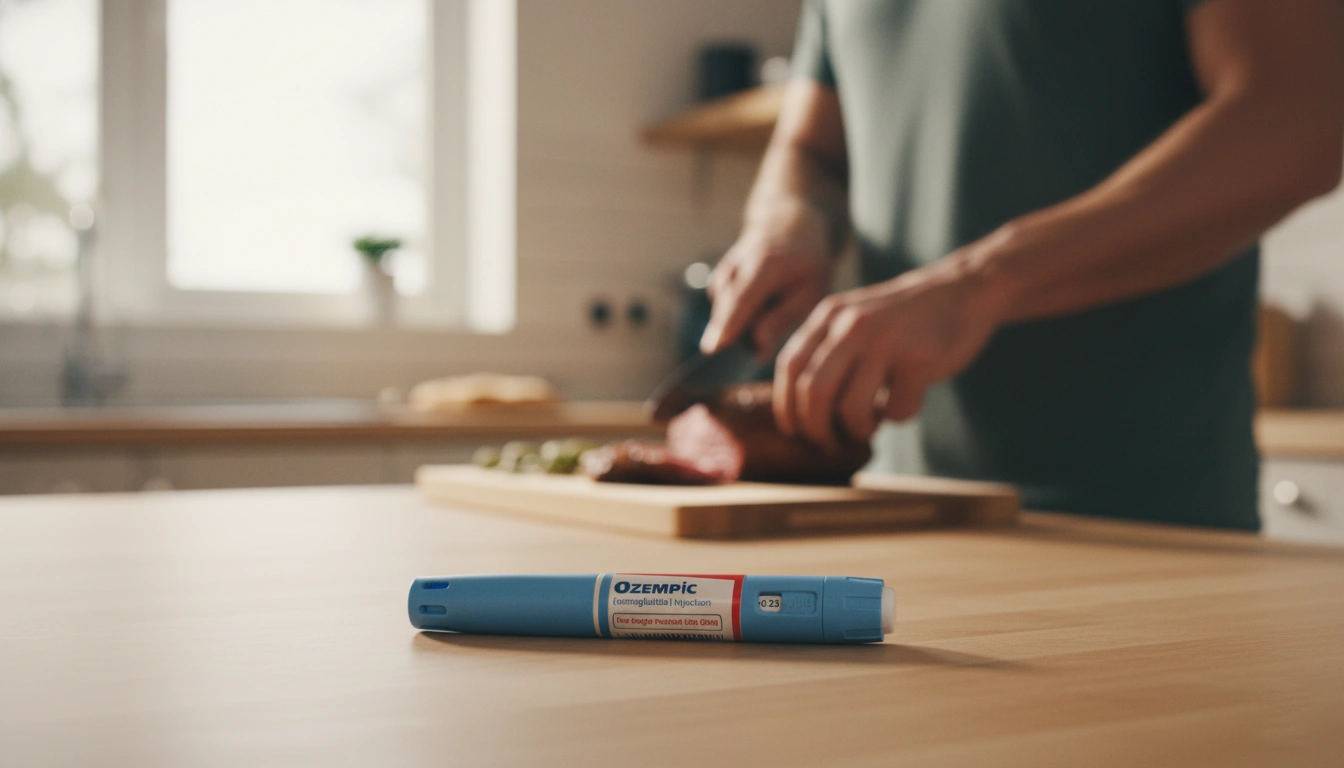How to Maintain Weight Loss After Ozempic: Essential Strategies for Long-Term Success

When it comes to weight loss, many individuals find themselves at a crossroads after achieving their goals with medications like Ozempic. A staggering statistic reveals that nearly two-thirds of people regain weight within a year of discontinuing semaglutide-based treatments. This reality raises essential questions: How can we maintain weight loss after Ozempic? What strategies can we implement to ensure that our hard-earned progress doesn’t slip away?
At TrimRx, we understand that weight management is a nuanced journey, often requiring a blend of pharmacological support and sustainable lifestyle changes. This blog post aims to provide you with comprehensive insights and actionable strategies to help you navigate life after Ozempic, enhancing your chances of long-term success.
Introduction
Weight loss is a multifaceted endeavor that many of us undertake to improve our health and well-being. For those who have utilized Ozempic, a medication originally designed for type 2 diabetes management, the experience can be transformative. However, the challenge often arises when individuals stop taking the medication and find themselves struggling to maintain their weight loss.
The significance of this topic cannot be overstated; understanding how to maintain weight loss after Ozempic is crucial for anyone looking to achieve lasting health benefits. By the end of this post, we hope you will have a clear understanding of effective strategies to keep the weight off, even after discontinuing medication. We'll explore dietary adjustments, exercise regimens, the importance of support systems, and much more.
Our commitment at TrimRx is to provide personalized, medically supervised care designed to empower individuals on their weight loss journeys. With this in mind, let’s delve into the key strategies that can help you maintain your weight loss after Ozempic.
Understanding Ozempic and Its Impact on Weight Loss
What is Ozempic?
Ozempic (semaglutide) is part of a class of drugs known as GLP-1 receptor agonists, which help regulate blood sugar levels and suppress appetite. The medication mimics the effects of the naturally occurring hormone GLP-1, which plays a vital role in appetite regulation and glucose metabolism. By doing so, Ozempic not only aids in weight loss but also helps individuals with type 2 diabetes manage their condition more effectively.
How Ozempic Affects Your Body
While on Ozempic, many users report reduced hunger and increased feelings of fullness, making it easier to consume fewer calories. However, once the medication is discontinued, the physiological changes it induced are reversed. This can lead to an increase in appetite and cravings, often resulting in weight regain. Understanding this mechanism is crucial for implementing effective strategies to mitigate weight regain.
The Reality of Weight Regain
Research indicates that weight regain is common after stopping Ozempic. A study noted that individuals may regain up to two-thirds of their lost weight within a year of discontinuation. This phenomenon is often referred to as the "Ozempic rebound." Recognizing that weight loss is not simply achieved through medication, but rather sustained with ongoing lifestyle changes, is essential for long-term success.
Key Strategies for Maintaining Weight Loss After Ozempic
1. Adopt a Balanced and Nutrient-Dense Diet
One of the most effective ways to maintain weight loss is by embracing a balanced diet that prioritizes whole, nutrient-dense foods. Here are some specific recommendations:
- Focus on High-Quality Proteins: Foods rich in protein, such as chicken, fish, legumes, and low-fat dairy, can help you feel fuller for longer and support muscle retention.
- Incorporate Plenty of Fiber: High-fiber foods, including fruits, vegetables, whole grains, and legumes, not only promote satiety but also aid in digestion.
- Limit Processed Foods and Sugars: Reducing your intake of processed snacks and sugary foods can help stabilize blood sugar levels and prevent unnecessary cravings.
- Practice Mindful Eating: Pay attention to hunger cues and eat slowly to allow your body to signal when it is full.
By laying the foundation of a healthy diet, you can create an environment that supports weight maintenance even after discontinuing Ozempic.
2. Establish a Consistent Exercise Routine
Regular physical activity is crucial for maintaining weight loss. The Centers for Disease Control and Prevention (CDC) recommends at least 150 minutes of moderate-intensity aerobic exercise each week, along with strength training on two or more days. Here’s how to get started:
- Find Activities You Enjoy: Whether it’s dancing, swimming, walking, or cycling, choose activities that you look forward to. This will make it easier to stick to your routine.
- Incorporate Strength Training: Building muscle helps boost your metabolism, making it easier to maintain your weight. Consider lifting weights or participating in resistance training classes.
- Stay Active Throughout the Day: In addition to structured workouts, look for opportunities to move more throughout your day. Simple changes, like taking the stairs or going for a walk during breaks, can add up.
3. Monitor Your Progress Regularly
Keeping track of your weight and other health metrics can help you stay accountable and motivated. Here are some ways to monitor your progress effectively:
- Weigh Yourself Weekly: Establish a consistent day and time for weighing yourself to track changes. This provides a clear picture of your trends over time.
- Keep a Food Journal: Documenting what you eat can help identify patterns and areas for improvement. This practice can also increase awareness of portion sizes and food choices.
- Set Realistic Goals: Focus on maintaining your weight rather than aiming for further weight loss. Setting achievable goals can prevent feelings of discouragement.
4. Build a Support System
Having a strong support system is vital for maintaining weight loss. Surround yourself with people who understand your journey and can offer encouragement. Here are some effective ways to build your support network:
- Engage with a Community: Whether through online forums, local weight loss groups, or fitness classes, connection with others can provide motivation and accountability.
- Seek Professional Guidance: Consider working with a registered dietitian or a weight management coach. Professionals can provide personalized strategies and insights tailored to your needs.
- Communicate Your Goals: Share your weight maintenance goals with friends and family. Their understanding and support can make a significant difference in your journey.
5. Prioritize Sleep and Stress Management
Both sleep and stress play critical roles in weight management. Lack of sleep can lead to increased hunger and cravings, while stress can trigger emotional eating.
- Aim for Quality Sleep: Strive for 7-9 hours of quality sleep each night. Consider establishing a calming bedtime routine and creating a sleep-friendly environment to promote restful sleep.
- Manage Stress Effectively: Incorporate stress-reducing activities, such as mindfulness meditation, yoga, or deep breathing exercises, into your daily routine. Finding healthy outlets for stress can prevent emotional eating.
Conclusion
Navigating life after Ozempic can be challenging, but with the right strategies, maintaining weight loss is achievable. By adopting a balanced diet, committing to regular exercise, monitoring your progress, building a support system, and prioritizing sleep and stress management, you can enhance your chances of long-term success.
At TrimRx, we believe in the power of personalized care and support. If you're interested in exploring our medically supervised weight loss programs, we invite you to take our free assessment quiz to see if you qualify for prescription weight loss medications. Together, we'll work towards making sustainable weight loss a reality for you.
FAQ
What happens when I stop taking Ozempic?
When you stop taking Ozempic, the appetite-suppressing effects diminish, which can lead to increased hunger and potential weight regain.
How can I prevent weight regain after stopping Ozempic?
To minimize weight regain, focus on adopting a balanced diet, establishing a regular exercise routine, monitoring your progress, building a support system, and managing stress effectively.
Is it necessary to continue medication for weight maintenance?
While medications like Ozempic can be helpful for weight loss, they are not a cure. Building sustainable lifestyle changes is essential for long-term weight maintenance.
How long can I stay on Ozempic?
Consult your healthcare provider for personalized guidance regarding the duration of Ozempic use based on your specific health needs and goals.
Where can I find support during my weight loss journey?
Consider engaging with local weight loss groups, online communities, or working with healthcare professionals who specialize in weight management for support and accountability.
We hope this post has provided you with valuable insights into maintaining weight loss after Ozempic. Remember, at TrimRx, we are here to support you every step of the way on your weight loss journey.

Transforming Lives, One Step at a Time
Keep reading
Thyroid Issues and Ozempic: Safety Considerations
If you have a thyroid condition and you’re considering Ozempic or another GLP-1 medication for weight loss, you’ve probably come across some alarming language…
Postpartum Weight Loss: Is Ozempic Safe?
The postpartum period is one of the most physically and emotionally demanding stretches of a woman’s life, and for many new mothers, weight retained…
Ozempic While Trying to Conceive: What to Know
If you’re trying to get pregnant and also managing your weight with Ozempic, you’re navigating a genuinely complex situation. The short answer: most providers…



